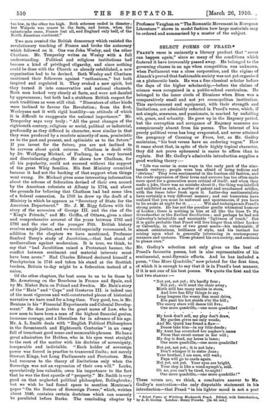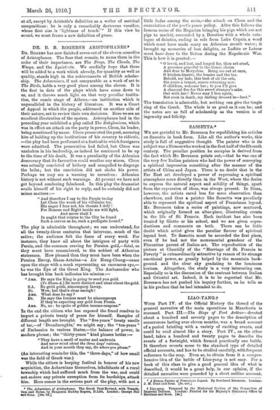SELECT POEMS OF PRA_ED.* PRIED'S verse is eminently a literary
product that "nerd can happen again," since so many of the conditions which fostered it have irrevocably passed away. He belonged to the governing classes in an age when competition was unknown, when Parliament was a close corporation, and the regime of
Alniack's proved that fashionable society was not yet organised on a plutocratic basis. He was a fine classical scholar before
the days of the higher scholarship,—before the claims of science were recognised in a public-school curriculum. He belonged to the inner circle of Etonians when Eton was a comparatively small and not yet cosmopolitan institution. This environment and equipment, with their strength and limitations, are admirably reflected in Praed's verse, which, if not simple, sensuous, and passionate, is marked by unfailing wit, grace, and urbanity. He grew up in the Regency period, but the corruption and arrogance of Regency manners are conspicuously absent from his poems. The interest of his purely political verse has long evaporated, and never attained the pungency of Canning or Frere, but, as Mr. Godley maintains, "his best verses have an enduring vogue." How it came about that, in spite of their highly topical character, they did not prove ephemeral is easier to affirm than to explain. But Mr. Godley's admirable introduction supplies a good working theory :—
"Life was easier in some ways in the early part of the nine- teenth century; people were less afraid of being tedious and obvious.' They were sentimental in the fearless old fashion, and the crude expression of their loves and sorrows has too often made mere sport for a generation more critical of itself: and when they made a joke, there was no mistake about it ; the thing was labelled and exhibited as such, a matter of patent and unnahamed artifice, with the limas labor fresh upon it. Latter-day sentimentalists have certainly a very different manner; and our humorists have realized that you must be unforced and spontaneous, if you have to lie awake at night for it Wit and technique are Praed's strong points. He has not the peculiar gentle whimsical humour of Looker ; there is nothing in him at all like the lines To My Grandmother or the Earliest Recollection ; and perhaps he had not Calverley's inimitable and nnseizable lightness of touch.' But it is quite probable that Praed will live longer than either Locker or Calverley, in virtue of two great assets—his undeniable, if almost ostentatious, brilliance of style, and his instinct for seizing upon what is generally interesting in contemporary manners and customs. These pleased his own society, and continue to please ours."
Mr. Godley's selection not only gives us the best of Praed's favourite poems, but is also representative of his sentimental, semi-Byronic efforts. And he has included a poem, "One More Quadrille," now printed for the first time, of which it is enough to say that it is in Praed's best manner, if it is not one of his best poems. We quote the first and the last two stanzas :—
"Not yet, not yet ; it's hardly four ; Not yet; we'll send the chair away;
Mirth still has many smiles in store, And love has fifty things to say. Long leagues the weary Sun must drive, Ere pant his hot steeds o'er the hill ; The merry stars will dance till five; One more quadrille,—one more quadrille!
My book don't sell, my play don't draw, My garden gives me only weeds;
And Mr. Quirk has found a flaw—
Deuce take him—in my title-deeds ; My Aunt has scratched her nephew's name From that sweet corner in her will ; My dog is dead, my horse is lame; One more quadrille,—one more quadrille !
Not yet, not yet ; it is not late ; Don't whisper it to sister Jane ; Your brother, I am sure, will wait ;
Papa will go to cards again.
Not yet, not yet. Your eyes are bright, Your step is like a wood-nymph's, still.
Oh no, you can't be tired, to-night!
One more quadrille,—one more quadrille!"
These verses are, we think, a conclusive answer to Ms. Godley's contention—the only disputable statement in his introduction—that Praed "in his lighter mood is not a poet • Sited Poems of Winthrop Mackworth Pined. Edited, with Introduction, by A. D. Godley. London: Ham", Frowde. [2e. 6d. net.]
at all, except by Aristotle's definition as a writer of metrical compositions : he is only a remarkably dexterous versifier, whose first aim is lightness of touch." If this view be sound, we must frame a new definition of prose.







































 Previous page
Previous page